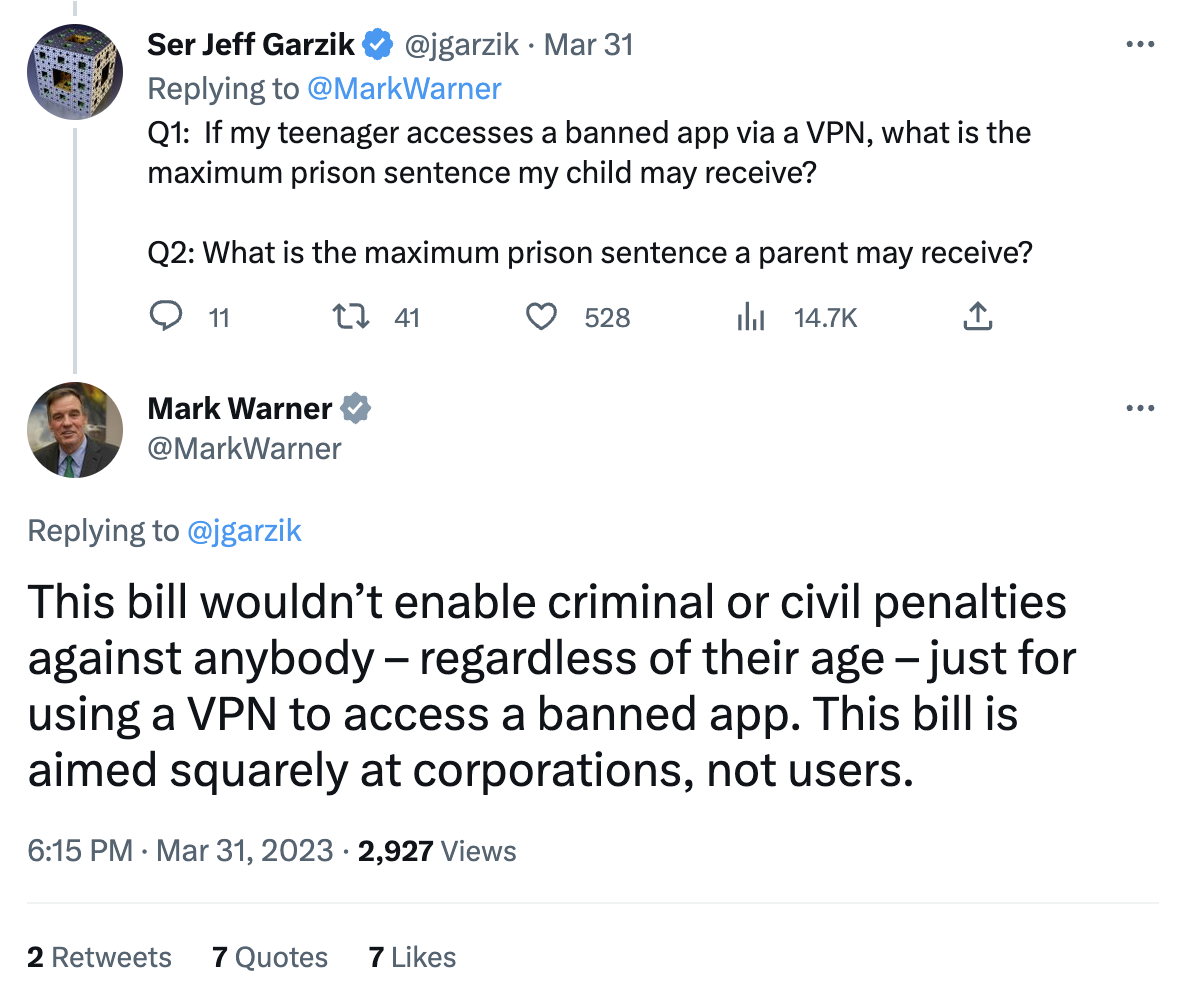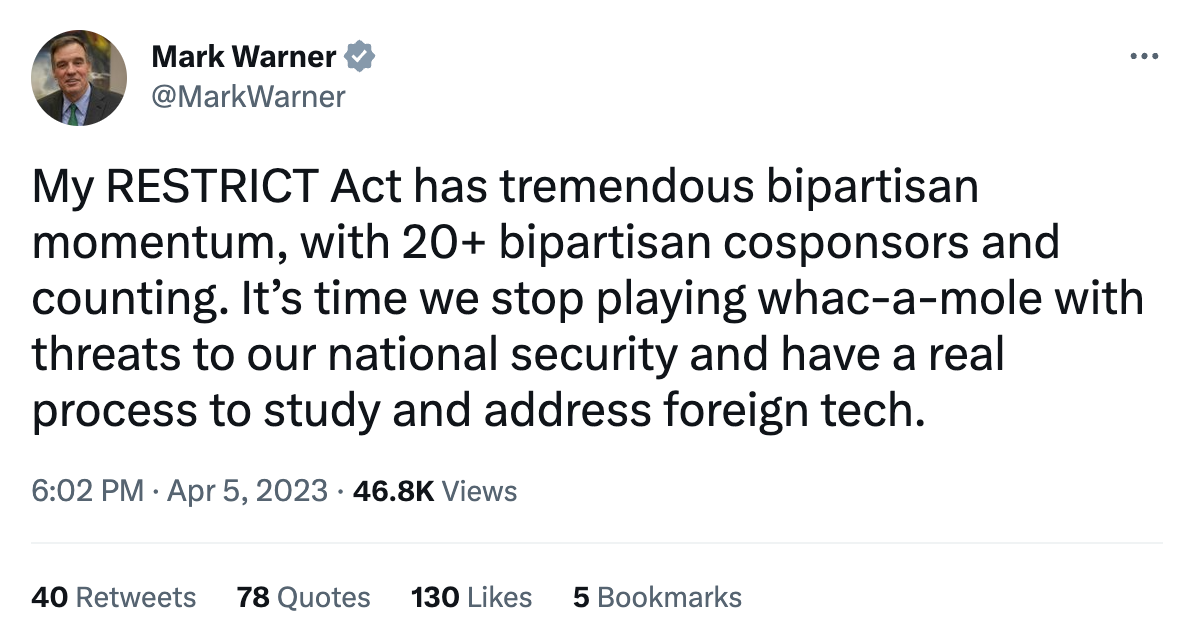45 days after 9/11, the United States government passed the PATRIOT Act — a chilling law that used the guise of “national security” to greatly expand the federal government’s secret surveillance powers.
Almost 23 years later, another far-reaching bill, the “Restricting the Emergence of Security Threats that Risk Information and Communications Technology Act,” better known by its acronym, the RESTRICT Act, is using the same national security talking point to justify further federal government encroachment on Americans’ rights.
Although the bill doesn’t mention TikTok, its authors, Democratic Senator Mark Warner and Republican Senator John Thune, have framed it as “the best way to counter the TikTok threat.”
However, the impact of the bill extends far beyond TikTok and gives the US government sweeping powers to ban a wide range of apps and services.
The bill authorizes the Secretary of Commerce to review and prohibit “current, past, or potential future transactions” involving technology products or services with more than one million US-based annual active users that:
- Are deemed to pose an “undue or unacceptable risk” in various areas (such as national security and election interference)
- Involve anyone determined to be “owned, directed, or controlled” by a “foreign adversary” (a term that can currently be applied to China, Cuba, Iran, North Korea, Russia, and Venezuela but can be extended to other nations by the Secretary)
The Secretary of Commerce can also refer these tech products and services to the President who can take action to “compel divestment of, or otherwise mitigate the risk” associated with them.
Caitlin Vogus, the deputy director of rights group the Center for Democracy & Technology’s Free Expression Project, warned that these powers target the free speech rights of Americans. In a statement to Motherboard, she said:
“The RESTRICT Act could lead to apps and other ICT [information communication technology] services with connections to certain foreign countries being banned in the United States. Any bill that would allow the US government to ban an online service that facilitates Americans’ speech raises serious First Amendment concerns.”
Rights groups have also sounded the alarm about the RESTRICT Act’s threats to fine or imprison those who attempt to “evade the provisions” of the bill — a threat that they fear could be aimed at US citizens who attempt to access banned apps or services.
The RESTRICT Act states: “No person may engage in any transaction or take any other action with intent to evade the provisions of this Act.”
The bill even makes it unlawful to “approve” of “any act” that tries to evade the provisions of the bill.
People that violate these rules can be fined up to $1 million and imprisoned for up to 20 years.
Senator Warner has insisted that these penalties won’t be used to target individual users.

However, digital rights group the Electronic Frontier Foundation (EFF), has noted that the bill doesn’t actually prevent individual users from being targeted. In an article about the RESTRICT Act, the EFF warned:
“Due to undefined mitigation measures coupled with a vague enforcement provision, the bill could also criminalize common practices like using a VPN or side-loading to install a prohibited app.”
Another concerning aspect of the RESTRICT Act is that it allows the Secretary of Commerce to form technical advisory committees without them being subject to Chapter 10 of part 1 of title 5 of the United States Code.
This section of the law aims to reduce “the undue influence” of special interests and lobbyists. It allows Congress to review the proposed activities of advisory committees before they’re formed and ensure that these committees aren’t being “inappropriately influenced” by special interests. It also requires advisory committees to report their activities and goals to Congress, make their meetings open to the public, make transcripts available to the public, and file reports with the Library of Congress.
Excluding RESTRICT Act advisory committees from this section of the law opens the door for lobbyists representing US tech giants to serve on these committees, push for their competitors in other countries to be banned, and further cement their dominance.
And the problems don’t end here. The RESTRICT Act also limits judicial, congressional, and public scrutiny of the government’s actions.
Actions taken by the Secretary of the Treasury under this act are exempt from sections 551, 553-559, and 701-707 of title 5 of the United States Code — sections that require federal officials and agencies to provide public notice when proposing rule making, allow interested persons to participate in the rule making, and give those who suffer legal wrong as a result of government action the right to judicial review.
The scope of judicial review under the RESTRICT Act is limited to the US Court of Appeals for the District of Columbia Circuit and the court is prohibited from disturbing “any action taken” by the Secretary or the President when they review or prohibit transactions or take action against tech products and services, unless a petitioner demonstrates that the action is unconstitutional or violates a statutory command.
Additionally, Americans have “no right of access” to the information that the government uses when deciding whether to prohibit transactions involving technology products or services under this bill. The Freedom of Information Act also doesn’t apply to any information submitted by affected parties or created by the government when reviewing such transactions.
We obtained a copy of the RESTRICT Act for you here.
Despite the glaring problems with the bill, its architects are blaming TikTok for the criticism and claiming that the owners of the app are “spreading false claims about the Restrict Act in an effort to continue operating with impunity.”
According to Warner, the RESTRICT ACT has more than 20 bipartisan cosponsors.

The bill also has the full support of the Biden White House which has already demonstrated that it’s no fan of free speech and is currently being sued for alleged First Amendment violations.
If the RESTRICT Act passes, the Biden admin and any future pro-censorship administrations will be handed new powers to continue their crackdowns on online speech.







